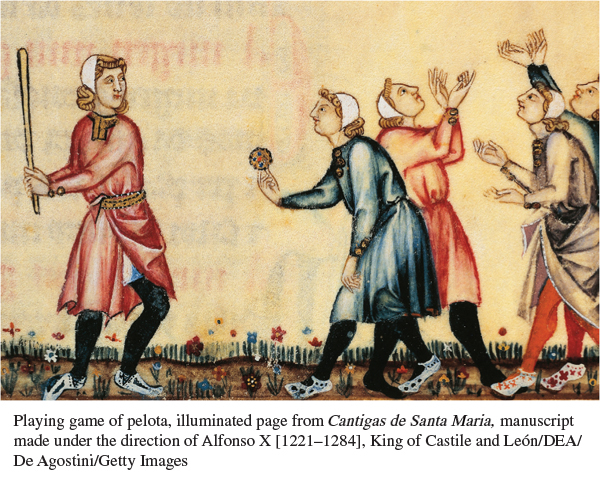A History of Western Society: Printed Page 308
A History of Western Society, Value Edition: Printed Page 296
A History of Western Society, Concise Edition: Printed Page 309
Popular Entertainment
Games and sports were common forms of entertainment and relaxation. There were wrestling matches and games akin to modern football, rugby, stickball, and soccer in which balls were kicked, hit, and thrown. People played card and board games of all types. They played with dice carved from stone or bone, or with the knucklebones of animals or wood carved in knucklebone shapes, somewhat like modern jacks. They trained dogs to fight each other or put them in an enclosure to fight a captured bear. In Spain, Muslim knights confronted and killed bulls from horseback as part of religious feast days, developing a highly ritualized ceremony that would later be further adapted by Spain’s Christians. All these sports and games were occasions for wagering and gambling, which preachers sometimes condemned (especially when the games were attached to a holiday or saint’s day celebration) but had little power to control.

Religious and family celebrations also meant dancing, which the church also had little success banning or regulating. Men and women danced in lines toward a specific object, such as a tree or a maypole, or in circles, groups, or pairs with specific step patterns. They were accompanied by a variety of instruments: reed pipes such as the chalumeau (an ancestor of the clarinet) and shawm (predecessor to the oboe); woodwinds such as flutes, panpipes, and recorders; stringed instruments including dulcimers, harps, lyres, lutes, zithers, and mandolins; brass instruments such as horns and trumpets; and percussion instruments like drums and tambourines. Many of these instruments were simple and were made by their players. Musicians playing string or percussion instruments often sang as well, and people sang without instrumental accompaniment on festive occasions or while working.